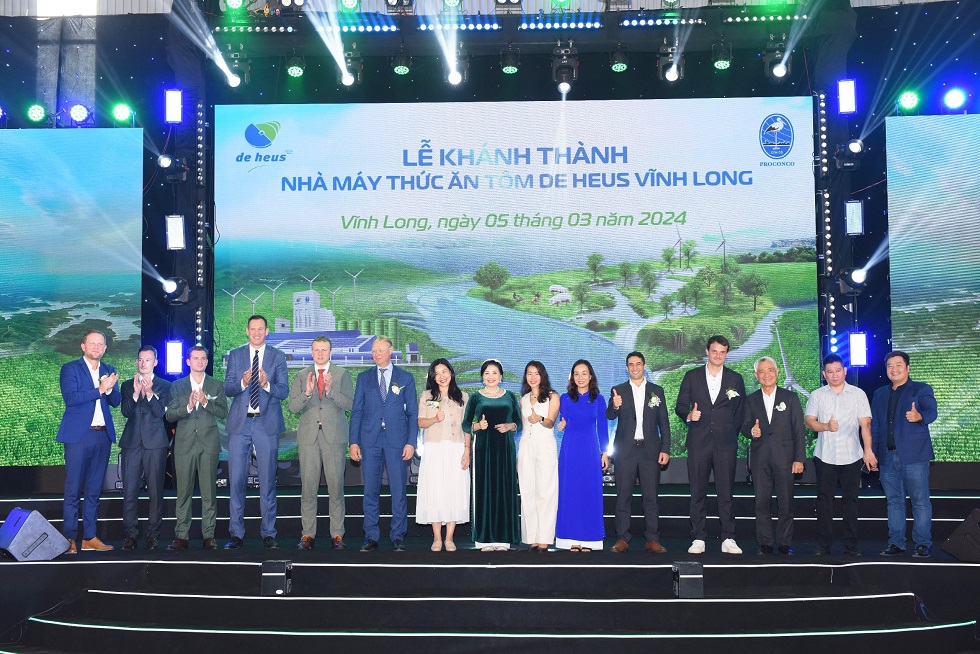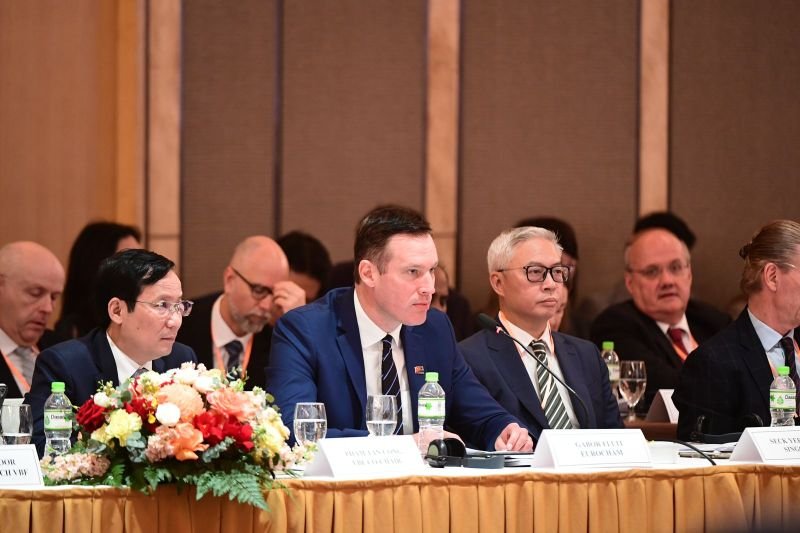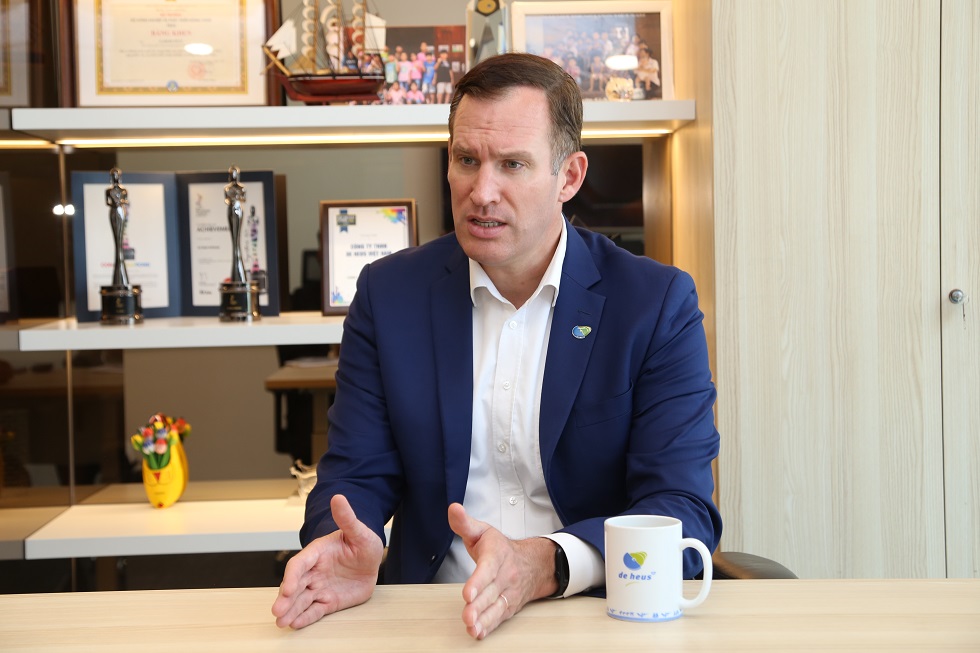Having been operational for more than a century, De Heus Animal Nutrition stands as a testament to resilience, innovation, and adaptability in the dynamic landscape of animal nutrition. Recently, the company made headlines with a strategic shift in its global management structure, signifying a new era under the leadership of Gabor Fluit as their new Group CEO. In an interview with The Saigon Times, Fluit discussed the company’s storied history, pivotal milestones, and future aspirations, highlighting a steadfast commitment to both tradition and progressive transformation.
The Saigon Times: Why did De Heus decide to change the current management structure at the global level?
Gabor Fluit: De Heus, a family-owned business established in 1911, has seen remarkable growth under the leadership of brothers Koen & Co de Heus, the 4th generation of the family who have served as CEOs since 2007. After nearly two decades in these roles, they have decided to transition to co-chairmen of the Board. This restructuring allows them to focus on long-term strategy and stakeholder engagement while I step into the role of CEO. Despite the change, the steadfast commitment to maintaining the company as a family-owned business remains unwavering. With a turnover increase from approximately 1 billion euros in 2007 to about 7 billion euros last year, the company is healthy and well-positioned for the future.
What are the most important milestones for you and De Heus when looking back at these 15 years?
In 2008, we started as a small, new company in Vietnam, starting with feed mills in Binh Duong and Haiphong. By 2012, significant milestones were achieved with the inauguration of our first large feed mill in Dong Nai Province and with our expansion into the aqua market. In 2013, we ventured into genetics through our Bel Ga parentstock poultry farm and hatchery business. Over the years, we expanded within Vietnam and regionally through both organic growth and acquisitions, entering markets like Myanmar, Indonesia, India, and Cambodia.
The acquisition of Masan’s feed business in 2021 stands out as a pivotal moment, substantially increasing our turnover in Vietnam and consolidating our position as one of the largest feed companies in the Vietnamese market. In parallel, we have also made significant advancements in genetics multiplication, establishing swine genetics farms across Vietnam with partners like the Hung Nhon Group. Recently, we inaugurated our first dedicated shrimp feed factory in Vietnam, showing our ambition in developing the shrimp sector.
Reflecting on this, there have been notable milestones, such as the honor of having the Queen of the Netherlands, Máxima, inaugurate our feed mill extension in 2011, and the achievement of having our value chain’s first export of poultry meat to Japan in 2017 with Koyu Unitek. Throughout, we’ve focused on customer development, exemplified by facilitating Vietnamese farmers’ visits to Europe to showcase high-tech agricultural practices.
De Heus is a leading animal nutrition business in Vietnam. How much does it mean to Vietnam when you are taking on this new role?
In my new role, I believe I can contribute significantly to addressing both the challenges and opportunities within Vietnam’s dynamic agricultural sector. As Vietnam’s population will soon surpass 100 million and its economy will transit to high-income status by 2045 or 2050, there’s a growing demand for affordable and high-quality products. I am convinced that Vietnamese consumers are increasingly focused on traceability, food quality and sustainability. As a company, we have a responsibility to meet these demands and ensure our supply chains are sustainable. Furthermore, with Vietnam aiming to achieve net zero greenhouse gas emissions by 2050, the agriculture sector plays a crucial role in achieving this goal. I am committed to working closely with the Vietnamese leadership team, supporting them in realizing innovative ideas and investments that align with our long-term goals for De Heus. Together, we will navigate the challenges and capitalize on the opportunities presented by Vietnam’s evolving agricultural landscape.

What steps are you taking to prepare for this new responsibility, especially considering the change in focus from Asia to a broader scope?
We have great confidence in our team. The CEO of De Heus Vietnam, Johan van den Ban, will now oversee Cambodia, Myanmar, and India in addition to Vietnam, while further strengthening Vietnam’s leadership team. Our Asia leadership team, with many based in Saigon, supports the entire region. De Heus Indonesia, led by Kay De Vreese, will continue reporting directly to me. Our priority remains on our customers and partners, developing successful value chain cooperation initiatives together. With our strong teams, we’re poised for continued success and growth.

What is your vision for De Heus Animal Nutrition? Are there any specific strategic initiatives or areas of growth that you intend to prioritize?
We have had a successful history already, and I’m excited to contribute to our ongoing success. Our focus includes leveraging technology like automation and digitization to improve efficiency and facilitate data-driven decision-making. To De Heus, Asia remains a key growth region, with Africa and South America increasingly important, next to our key home base in Europe. We’re investing in developing countries, transferring knowledge to local farmers, and promoting access to safe and affordable food globally. We are rapidly deploying solar energy in Vietnam and actively advocating for supportive regulations and policies. Our goal is to grow our business while enhancing food supply chains sustainably, benefiting all the countries where we are active.

What do you see as the major trends and challenges in the animal nutrition industry? How will De Heus Animal Nutrition adapt to them?
In the animal nutrition industry, our focus is on continually improving feed quality and sourcing while navigating geopolitical challenges affecting logistics. We are actively investing in local sourcing initiatives, such as facilitating corn farming cooperatives in Vietnam’s Central Highlands and utilizing rice byproducts from the Mekong Delta. By maximizing the use of byproducts that humans cannot consume, we contribute to a more sustainable world. We’re also part of global initiatives to combat deforestation, particularly in South America. Collaboration with local suppliers and governments in Asia helps optimize feed quality and usage. Our goal is to assist farmers in achieving the best technical results through quality feed, genetics, disease management, and farming practices while reducing environmental impacts.
What are your goals for your first year in the new role?
As a leader within De Heus, I firmly believe that our most valuable assets are our people and business partners. After 16 years in Asia, I have developed trust and confidence in our teams there, but I also recognize the importance of understanding and supporting other parts of the organization. In my new role, I plan to travel frequently to Asia to stay updated on developments, while also visiting other countries within our company to better understand their challenges and opportunities. Although travel may impact my carbon footprint, I’m committed to doing so efficiently while prioritizing engagement and collaboration across the organization.

You have worked a lot on advocacy activities between Vietnam and the European Union. Could you brief us on your main achievements during the years in EuroCham and how will the relationship between Vietnam and European countries grow in the future?
My responsibilities with EuroCham started 10 years ago when I was a founding member of the Food Agri & Aqua Business Sector Committee (FAABS) and now have been in the board of EuroCham for three years. During my board term, I served for two years as vice-chairman, and the last year as chairman. I stepped down after just one year because I move into this new role at De Heus. EuroCham is representing 1,400 mainly European companies and some Vietnamese companies that have close cooperation with European companies. We are unique because we operate independently and are self-funded, not subsidized by any government and therefore our voices are those of the independent business communities in Vietnam. Our advocacy efforts with the Vietnamese Government are highly valued, focusing on issues such as administrative reforms and improving the overall business climate for all companies active in Vietnam. One of the remarkable aspects of working in Vietnam is the Government’s genuine willingness to listen and engage; we are frequently consulted during the drafting of new laws and initiatives aimed at improvement. While progress takes time, EuroCham has achieved tangible results, and I am proud to have served as chairman.









